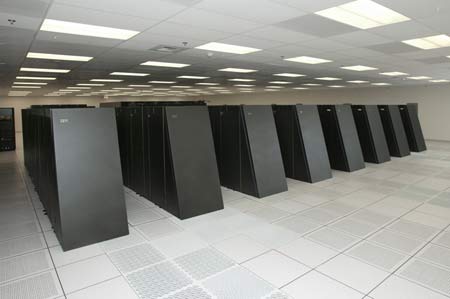World's Fastest Computer Now Twice as Fast

SAN JOSE, Calif. (AP) -- An IBM-built computer that has topped the list of the world's 500 most powerful supercomputers has widened its lead in the latest ranking released Monday.
The computer named Blue Gene/L, deployed at Lawrence Livermore National Laboratory, has doubled its performance to 280.6 trillion calculations per second (teraflops), up from 136.8 teraflops from the list released in June.
The system, which is used to study the U.S. nuclear stockpile and perform other research, was officially completed this summer after it was doubled in size. Researchers expect it will hold the top spot for the foreseeable future.
"This is as fast as this will get under the contract we have, but it's not limited to be only this fast,'' said Dave Turek, vice president of deep computing at IBM. "If Livermore were to have an interest in taking it bigger, we could do that.''
International Business Machines Corp. built the top three systems on the list released Monday by the Top 500 project, an independent group of university computer scientists who release supercomputer rankings every six months.
Big Blue built 43.8 percent of the systems on the entire list.
The No. 2 machine is another Blue Gene system, with performance ranked at 91.2 teraflops. It's installed at IBM's Thomas Watson Research Center. The No. 3 system, also at LLNL, reached 63.4 teraflops in the test.
Sign up for the Live Science daily newsletter now
Get the world’s most fascinating discoveries delivered straight to your inbox.
Hewlett-Packard Co. is the No. 2 manufacturer, with 33.8 percent of the machines on the list. No other computer maker has more than 7 percent in any category.
Of the chip makers, Intel Corp. microprocessors were used in a total of 333 systems, with 81 using the company's EM64T technology. IBM chips are in second place, with its Power microprocessors at the heart of 73 systems.
Advanced Micro Devices Inc.'s Opteron chips were used in 55 systems, up from 25 six months ago.
Of all the systems, the majority -- 305 -- are installed in the United States. Europe is represented by 100 systems on the list, while Asia has 66.
Japan's Earth Simulator, which topped five lists until it was dethroned by Blue Gene/L's prototype last November, slipped to the No. 7 spot. It was a source of much American angst when it first topped the list in 2002.
"One year after it was dethroned, it's kicked down to No. 7,'' said Erich Strohmaier, a compiler of the Top 500 list and a computer scientist at Lawrence Berkeley National Laboratory. "That shows the turnover in the top 10.''
The list, which has been issued twice a year since June 1993, is also compiled by Horst Simon of LBNL, Jack Dongarra at the University of Tennessee, Knoxville, and Hans Meuer of the University of Mannheim, Germany.
The latest list will be released officially Tuesday at a supercomputer conference in Seattle.









